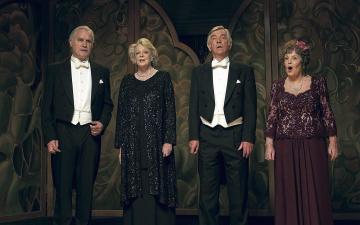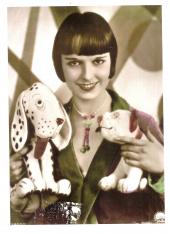Fine 'Quartet' sings of travails of aging
Seems there's a mini-glut of movie quartets these days. A "late" one of the Beethoven string type just opened here a fortnight ago. Now, on its heels, comes the vocal variety -- even later in the lives of its members.
"Quartet" is Dustin Hoffman's directorial debut, at the tender age of 75. It takes place at Beecham House, a home -- a very posh, stately home/former estate -- for retired musicians in idyllic rural England. There, septuagenarian opera singers Reggie (Tom Courtenay), Wilfrid (Billy Connolly) and Cecily (Pauline Collins) are busily engaged in rehearsals for the big annual fundraising concert on Giuseppe Verdi's birthday.
That's three. It takes four to make a quartet and a better conflict. Enter Jean (Maggie Smith), who used to be their fourth -- and used to be Reggie's wife -- until abandoning both positions long ago in favor of solo-career stardom. She has no idea her ex-husband and ex-colleagues live there. They have no idea she's coming to do same.
Jean's arrival thoroughly disrupts the tranquility and delicate equilibrium of Beecham House. Then and now and forever a diva, Jean grandly takes her meals in her room and refuses to sing or otherwise reunite with the old foursome -- each of whom is dealing with his or her own tragicomic demons.
Ronald Harwood's story and screenplay, based on his 1999 London stage play, was inspired by "Tosca's Kiss," the 1984 documentary about Milan's Casa di Riposo per Musicisti -- a home for elderly indigent musicians established by Verdi in 1896. The word "quartet," of course, is wonderfully tricky with multiple meanings: It refers here not just to the performing group but to the beloved four-voice showpiece "Bella figlia dell'amore" from Act 3 of Verdi's "Rigoletto," which our characters famously sang and recorded in their heyday -- and may or may not swan-song sing again.
If Dustin Hoffman's first-feature direction is not what you'd call dynamic, it's serviceable enough. Like Yaron Zilberman's direction of "A Late Quartet" (et al. movies about music), he doesn't trust nonverbal musical power enough to let the music itself do more of the storytelling. But this is an ensemble "actor's piece," and he gets great warmth and vibrancy from his world-class senior performers. Aging/ageless Ms. Smith (now 78) -- so horrified by having to be where she is -- carps about Beecham House with as much sting as on "Downton Abbey." Ms. Collins (age 72) is terrific as the childlike, eternally optimistic Cissy, earplugged -- with advancing dementia -- into the CD of her own "Rigoletto" 40 years ago. Scottish comedian Mr. Connolly (a mere 70) turns in a fine performance as the mischievous, incorrigible, ever-randy Wilfrid, hitting on every woman he sees with a combination of charm and offensiveness.
The best-drawn character is Mr. Courtenay's Reggie, the festering hostility of abandonment by fickle, faithless Jean offset by his quiet dignity and love of his art. One of the film's best scenes is one in which he shows students the similarity of emotional outpouring between opera and rap! Mr. Courtenay (now 75), who suffered "The Loneliness of the Long-Distance Runner" 50 years ago, exhibits the same nuance and elegance as ever, likely due to an affinity with Mr. Harwood, whose screenplay for "The Dresser" served as an excellent Courtenay vehicle back in 1983.
You'll also find Michael Gambon (72, but seems 92, now) of Harry Potter fame as an over-the-top, Oscar Wildean sort of geriatric impresario at the home, plus a number of other old real-life actors, vaudevillians and musicians in the cast, nicely identified and spotlighted in the final credits.
Gorgeous, idyllic Beecham House is a place to behold. I kept thinking of the less gorgeous and idyllic Motion Picture Home in California, America's end-of-the-line stop for elderly performers. No matter where, the comings -- and especially goings -- of such places are always sad and, as infirmities mount, the "living" declines to more and more "assisted."
If these "Quartet" members are somewhere between characters and caricatures, blame Mr. Harwood. Mr. Hoffman tries hard to walk the line between upbeat and grim. Is age just an inconvenience or a profound disability? Will there be a reunion or not for these artists in their third act?
Ms. Smith overdoes her fussy-old-lady role, as always, but the one great true thing she exhibits in it here is anxiety -- she's so terribly worried, so excruciatingly aware of what's happening to her.
Is it better to be batty, like Cissy?






